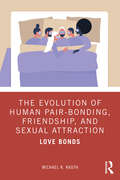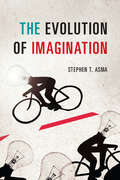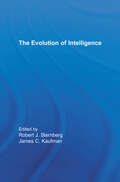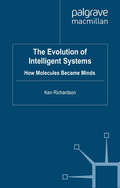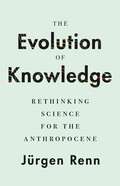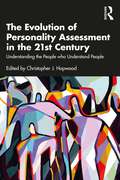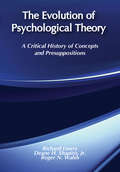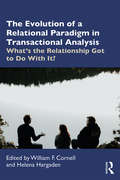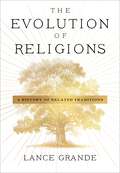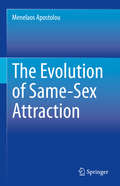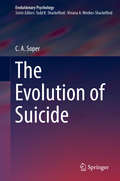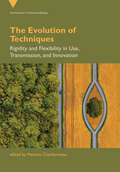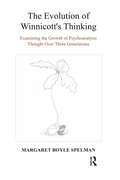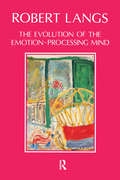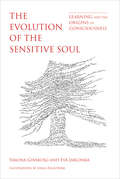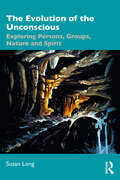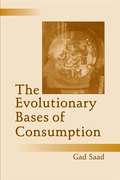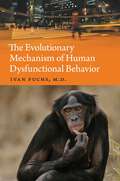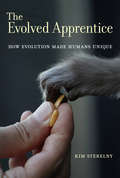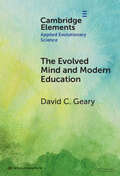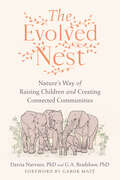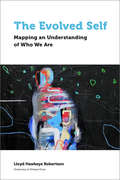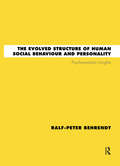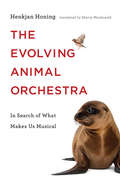- Table View
- List View
The Evolution of Human Pair-Bonding, Friendship, and Sexual Attraction: Love Bonds
by Michael R. KauthThe Evolution of Human Pair-Bonding, Friendship, and Sexual Attraction presents an evolutionary history of romantic love, male-female pair-bonding, same-sex friendship, and sexual attraction, drawing on sexuality research, gay and lesbian studies, history, literature, anthropology, and evolutionary science. Employing evolutionary theory as a framework, close same-sex friendship is examined as an adaptive trait that has harnessed love, affection, and sexual pleasure to navigate same-sex environments for both men and women, ultimately benefiting their reproductive success and promoting the inheritance of traits for friendship. Chapters consider the desire to form close same-sex friendships and ask if this is embedded in our biology, concluding that most humans have the capacity to form loving, meaningful, and sexual relationships with men and women. This book takes on a unique interdisciplinary approach and is essential reading for those studying and working in sexuality research, anthropology, sociology, evolutionary psychology, and gay and lesbian studies. It will also be of interest to marriage and family therapists as well as sex therapists.
The Evolution of Human Sociability
by Ron VannelliHow do desires and fears motivate human sociability? What effect do these motivators have on reproductive, social and political behaviour? And, crucially, how might we understand them separate from preconceived notions of design or higher morality? Taking these questions as a focus, this book examines human evolution with the emphasis on sexual selection and the evolution of a number of human psychological processes. Exploring evolutionary, sexual and maturational processes, along with primate, fossil and geological evidence, Vannelli argues that human nature can be conceptualised as species-typical desires and fears, derived from sexual selection during human evolution, and that these are major motivators of behaviour. Presenting additional evidence from the anthropology of band societies, along with material from group behaviour, Vannelli highlights the importance of pair-bonding, friendship, alliance behaviour, vengeance seeking and interpersonal politics in social behaviour, providing a unique interdisciplinary framework for understanding human nature and the evolution of human sociability.
The Evolution of Imagination
by Stephen T. AsmaConsider Miles Davis, horn held high, sculpting a powerful musical statement full of tonal patterns, inside jokes, and thrilling climactic phrases—all on the fly. Or think of a comedy troupe riffing on a couple of cues from the audience until the whole room is erupting with laughter. Or maybe it’s a team of software engineers brainstorming their way to the next Google, or the Einsteins of the world code-cracking the mysteries of nature. Maybe it’s simply a child playing with her toys. What do all of these activities share? With wisdom, humor, and joy, philosopher Stephen T. Asma answers that question in this book: imagination. And from there he takes us on an extraordinary tour of the human creative spirit. Guided by neuroscience, animal behavior, evolution, philosophy, and psychology, Asma burrows deep into the human psyche to look right at the enigmatic but powerful engine that is our improvisational creativity—the source, he argues, of our remarkable imaginational capacity. How is it, he asks, that a story can evoke a whole world inside of us? How are we able to rehearse a skill, a speech, or even an entire scenario simply by thinking about it? How does creativity go beyond experience and help us make something completely new? And how does our moral imagination help us sculpt a better society? As he shows, we live in a world that is only partly happening in reality. Huge swaths of our cognitive experiences are made up by “what-ifs,” “almosts,” and “maybes,” an imagined terrain that churns out one of the most overlooked but necessary resources for our flourishing: possibilities. Considering everything from how imagination works in our physical bodies to the ways we make images, from the mechanics of language and our ability to tell stories to the creative composition of self-consciousness, Asma expands our personal and day-to-day forms of imagination into a grand scale: as one of the decisive evolutionary forces that has guided human development from the Paleolithic era to today. The result is an inspiring look at the rich relationships among improvisation, imagination, and culture, and a privileged glimpse into the unique nature of our evolved minds.
The Evolution of Intelligence
by Robert J. Sternberg James C. KaufmanHow is one to understand the nature of intelligence? One approach is through psychometric testing, but such an approach often puts the "cart before the horse"--the test before the theory. Another approach is to use evolutionary theory. This criterion has been suggested by a number of individuals in the past, from Charles Darwin in the more distant past to Howard Gardner, Stephen Gould, Steven Pinker, Carl Sagan, David Stenhouse, and many others. The chapters in this book address three major questions: 1. Does evolutionary theory help us understand the nature of human intelligence? 2. If so, what does it tell us about the nature of human intelligence? 3. And if so, how has intelligence evolved? The goal of this book is to present diverse points of view on the evolution of intelligence as offered by leading experts in the field. In particular, it may be possible to better understand the nature and societal implications of intelligence by understanding how and why it has evolved as it has. This book is unique in offering a diversity of points of view on the topic of the evolution of human intelligence.
The Evolution of Intelligent Systems: How Molecules Became Minds
by Ken RichardsonHow could something as seemingly transcendental as the human mind have arisen from far simpler material beginnings? This book provides a comprehensive overview of evolution from pre-life and early life forms through increasing complexity to advanced cognitive systems using a new framework based on dynamic systems theory.
The Evolution of Knowledge: Rethinking Science for the Anthropocene
by Jürgen RennA fundamentally new approach to the history of science and technologyThis book presents a new way of thinking about the history of science and technology, one that offers a grand narrative of human history in which knowledge serves as a critical factor of cultural evolution. Jürgen Renn examines the role of knowledge in global transformations going back to the dawn of civilization while providing vital perspectives on the complex challenges confronting us today in the Anthropocene—this new geological epoch shaped by humankind.Renn reframes the history of science and technology within a much broader history of knowledge, analyzing key episodes such as the evolution of writing, the emergence of science in the ancient world, the Scientific Revolution of early modernity, the globalization of knowledge, industrialization, and the profound transformations wrought by modern science. He investigates the evolution of knowledge using an array of disciplines and methods, from cognitive science and experimental psychology to earth science and evolutionary biology. The result is an entirely new framework for understanding structural changes in systems of knowledge—and a bold new approach to the history and philosophy of science.Written by one of today's preeminent historians of science, The Evolution of Knowledge features discussions of historiographical themes, a glossary of key terms, and practical insights on global issues ranging from climate change to digital capitalism. This incisive book also serves as an invaluable introduction to the history of knowledge.
The Evolution of Personality Assessment in the 21st Century: Understanding the People who Understand People
by Christopher J. HopwoodThis edited volume provides readers with a deeper knowledge of the growth of personality assessment in North America over the past 40 years through the autobiographies of its most notable figures. Experts provide insights into their professional backgrounds, training experiences, their contributions and approaches to personality assessment, their perceptions of current trends, and their predictions about the future of the field. Each chapter explores topics of deep significance to the writer, fluidly intertwining theory and personal narrative. Beginning clinicians, scholars, and students will gain a better understanding of the major empirical advances that were made during the last generation regarding key questions about the nature of people, the structure of personality traits, and the connections between personality and mental health.
The Evolution of Psychological Theory: A Critical History of Concepts and Presuppositions
by Richard LowryFirst published in 1982. Routledge is an imprint of Taylor & Francis.
The Evolution of Relational Paradigms in Transactional Analysis: What's the Relationship Got to Do With It?
by Helena Hargaden William F. CornellIn this fascinating and robust volume, the editors have compiled a collection of articles that provides an account of their individual theoretical journeys as they trace the evolution of relational transactional analysis. They re-examine the term ‘relational’, offering the reader a multiplicity of ways in which to conceptualise the theory of transactional analysis from a truly pluralistic perspective. This collection of 14 stunning articles from the Transactional Analytic Journal, written over a period of nearly three decades, traces the evolutionary process of a way of thinking that incorporates both theoretical innovations and advanced methodological ideas. Central to the themes of this book is a theoretical understanding of the bidirectionality of the relational unconscious, alongside a methodology that not always, but most often, demands a two-person methodology in which the therapist’s subjectivity comes under scrutiny. Uniquely useful as a research tool for psychotherapists interested in the most up to date psychological theories, this book offers a perspective on relational theory that is both respectful and critical. It will be of enormously useful to the trainee, the researcher, the clinician and the supervisor and will help inform the development of a clinical dialectical mind.
The Evolution of Religions: A History of Related Traditions
by Lance GrandeThousands of religions have adherents today, and countless more have existed throughout history. What accounts for this astonishing diversity?This extraordinarily ambitious and comprehensive book demonstrates how evolutionary systematics and philosophy can yield new insight into the development of organized religion. Lance Grande—a leading evolutionary systematist—examines the growth and diversification of hundreds of religions over time, highlighting their historical interrelationships. Combining evolutionary theory with a wealth of cultural records, he explores the formation, extinction, and diversification of different world religions, including the many branches of Asian cyclicism, polytheism, and monotheism.Grande deploys an illuminating graphic system of evolutionary trees to illustrate historical interrelationships among the world’s major religious traditions, rejecting colonialist and hierarchical “ladder of progress” views of evolution. Extensive and informative illustrations clearly and vividly indicate complex historical developments and help readers grasp the breadth of interconnections across eras and cultures.The Evolution of Religions marshals compelling evidence, starting far back in time, that all major belief systems are related, despite the many conflicts that have taken place among them. By emphasizing these broad historical interconnections, this book promotes the need for greater tolerance and deeper, unbiased understanding of cultural diversity. Such traits may be necessary for the future survival of humanity.
The Evolution of Same-Sex Attraction
by Menelaos ApostolouThis book provides a comprehensive analysis of the evolutionary origins of same-sex attraction, evaluating multiple existing evolutionary theories. It combines empirical findings with theoretical arguments in order to review evidence on the prevalence rates of same-sex attraction and determine its genetic and environmental basis. Among the topics addressed:Attitudes towards same-sex attraction across human historyAssessing the weak selection pressures hypothesis of attractionAssessing the male choice hypothesis of attractionEvolution of same-sex attraction in men versus women The Evolution of Same-Sex Attraction will be of interest to academics and students of evolutionary and psychological sciences, filling a gap in literature on the origins of specifically same-sex attraction.
The Evolution of Suicide (Evolutionary Psychology)
by C A SoperIn this radical and reflective volume, psychotherapist and evolutionary psychologist C A Soper offers evolutionary analysis of a distinctly human behaviour: suicide. Soper’s ‘pain and brain’ model posits ancient emotion as the motivator for suicidal escape, but specific human cognitive adaptations as supplying the means. The framework also provides a basis for explaining why only a relatively small number of humans actually take their own lives. Two types of anti-suicide systems are hypothesised, active and reactive mechanisms designed to obstruct suicide, manifest in a diversity of interconnected human psychological phenomena that are otherwise hard to explain. Among these is the intriguing proposal that some symptoms of common mental disorders such as depression and addiction, long associated with suicidality, may function as anti-suicide survival mechanisms.Among the topics addressed:· Suicide as an adaptive problem in human evolution.· Nonhumans’ and young childrens’ immunity to suicide.· The causation and course of common mental disorders.· Psychodynamic defences, regulating the experiencing of painful life events.· Positive psychology in autonomic suicide prevention.· The protective role of spiritual and religious belief.· A novel evolutionary explanation of altruistic behavior.· The suicide taboo as a kroll system.· Prediction and prevention of suicide. In raising and considering key questions regarding this most controversial act, The Evolution of Suicide will appeal to researchers across a range of behavioural and life science disciplines. The book’s implications for clinical intervention and prevention will make it useful also to mental health professionals and those involved with formulating mental health policy.
The Evolution of Techniques: Rigidity and Flexibility in Use, Transmission, and Innovation (Vienna Series in Theoretical Biology)
by Mathieu CharbonneauA novel, interdisciplinary exploration of the relative contributions of rigidity and flexibility in the adoption, maintenance, and evolution of technical traditions.Techniques can either be used in rigid, stereotypical ways or in flexibly adaptive ways, or in some combination of the two. The Evolution of Techniques, edited by Mathieu Charbonneau, addresses the impacts of both flexibility and rigidity on how techniques are used, transformed, and reconstructed, at varying social and temporal scales. The multidisciplinary contributors demonstrate the important role of the varied learning contexts and social configurations involved in the transmission, use, and evolution of techniques. They explore the diversity of cognitive, behavioral, sociocultural, and ecological mechanisms that promote and constrain technical flexibility and rigidity, proposing a deeper picture of the enablers of, and obstacles to, technical transmission and change.In line with the extended evolutionary synthesis, the book proposes a more inclusive and materially grounded conception of technical evolution in terms of promiscuous, dynamic, and multidirectional causal processes. Offering new evidence and novel theoretical perspectives, the contributors deploy a diversity of methods, including ethnographies, field and laboratory experiments, cladistics and phylogenetic tree building, historiography, and philosophical analysis. Examples of the wide range of topics covered include field experiments with potters from five cultures, stability and change in Paleolithic toolmaking, why children lack flexibility when making tools, and cultural techniques in nonhuman animals.The volume&’s three thematic sections are:· Timescales of technical rigidity and flexibility· Rigid copying to flexible reconstruction· Exogenous factors of technical rigidity and flexibilityThe volume closes with a discussion by philosopher Kim Sterelny.ContributorsRita Astuti, Adam Howell Boyette, Blandine Bril, Josep Call, Mathieu Charbonneau, Arianna Curioni, Nicola Cutting, Bert De Munck, György Gergely, Anne-Lise Goujon, Ildikó Király, Catherine Lara, Sébastien Manem, Luke McEllin, Helena Miton, Giulio Ongaro, Sarah Pope-Caldwell, Valentine Roux, Manon Schweinfurth, Dan Sperber, Kim Sterelny, Dietrich Stout, James W. A. Strachan, Sadie Tenpas
The Evolution of Winnicott's Thinking: Examining the Growth of Psychoanalytic Thought Over Three Generations
by Margaret Boyle SpelmanWhat happens to the thinking of a thinker who refuses a discipleship? This book attempts to answer this question in relation to D. W. Winnicott and the evolution of his thinking. He eschewed a following, privileging the independence of his thinking and fostering the same in others. However Winnicott's thinking exerts a growing influence in areas including psychoanalysis, psychology, and human development. This book looks at the nature of Winnicott's thought and its influence. It first examines the development of Winnicott's thinking through his own life time (first generation) and then continues this exploration by viewing the thinking in members of the group with a strong likelihood of influence from him; his analysands (second generation) and their analysands (third generation).
The Evolution of the Emotion-Processing Mind: With An Introduction To Mental Darwinism
by Robert LangsIn attempting to unify psychoanalytic and evolutionary theories, Langs offers a concise account of the most current versions of Darwinian and neo-Darwinian theory. He then develops the arguement that the emotion processing mind is an organ of adaptation that has evolved by natural selection.
The Evolution of the Sensitive Soul: Learning and the Origins of Consciousness (The\mit Press Ser.)
by Eva Jablonka Simona GinsburgA new theory about the origins of consciousness that finds learning to be the driving force in the evolutionary transition to basic consciousness.What marked the evolutionary transition from organisms that lacked consciousness to those with consciousness—to minimal subjective experiencing, or, as Aristotle described it, “the sensitive soul”? In this book, Simona Ginsburg and Eva Jablonka propose a new theory about the origin of consciousness that finds learning to be the driving force in the transition to basic consciousness. Using a methodology similar to that used by scientists when they identified the transition from non-life to life, Ginsburg and Jablonka suggest a set of criteria, identify a marker for the transition to minimal consciousness, and explore the far-reaching biological, psychological, and philosophical implications.After presenting the historical, neurobiological, and philosophical foundations of their analysis, Ginsburg and Jablonka propose that the evolutionary marker of basic or minimal consciousness is a complex form of associative learning, which they term unlimited associative learning (UAL). UAL enables an organism to ascribe motivational value to a novel, compound, non-reflex-inducing stimulus or action, and use it as the basis for future learning. Associative learning, Ginsburg and Jablonka argue, drove the Cambrian explosion and its massive diversification of organisms. Finally, Ginsburg and Jablonka propose symbolic language as a similar type of marker for the evolutionary transition to human rationality—to Aristotle's “rational soul.”
The Evolution of the Unconscious: Exploring Persons, Groups, Nature and Spirit
by Susan LongDrawing on over four decades of professional and academic experience, Susan Long explores how the concept of the unconscious has evolved from the nineteenth to the twenty-first century, showing that it is more than an individual phenomenon, but also a group, organisational and institutional phenomena.Each chapter examines theories that use the idea of the unconscious, first covering the work of Schelling, Freud, Bion, and Lacan. After examining traditional psychoanalytic ethos, the author takes a look at the mid-twentieth century extension of the meaning of the unconscious towards the social field. Here, she explores three main traditional categories of approaches: the Neo-Freudians, the Frankfurt School and social scientists, historians and anthropologists. The book also covers the idea of approaching the unconscious from the perspective of the neurosciences, as well as its connections with nature, showing a broader, more cosmic view of the unconscious in nature and the universe. Lastly, Long looks at how we might understand today’s organisations and society through the lens of the changing ideas presented throughout the book. Broad sweeping and accessible, this book is a valuable resource for organisational psychologists, consultants, and managers exploring psychoanalytic and socioanalytic approaches, as well as those in academic settings wanting to pursue an interest in the unconscious.
The Evolutionary Bases of Consumption (Marketing And Consumer Psychology Ser.)
by Gad SaadThe Evolutionary Bases of Consumption by Gad Saad applies Darwinian principles in understanding our consumption patterns and the products of popular culture that most appeal to individuals. The first and only scholarly work to do so, this is a captivating study of the adaptive reasons behind our behaviors, cognitions, emotions, and perceptions. Thi
The Evolutionary Mechanism of Human Dysfunctional Behavior: Relaxation of Natural Selection Pressures throughout Human Evolution, Excessive Diversification of the Inherited Predispositions Underlying Behavior, and Their Relevance to Mental Disorders
by Ivan FuchsWhy is humanity by far the most successful animal in the animal kingdom, but when it comes to survival of the fittest, we pull against the impulse toward natural selection? Unique among vertebrates, humans develop and practice varied forms of dysfunctional or maladaptive behavior, the graver of which are categorized as mental disorders, which doesn&’t sustain our species. Dr. Ivan Fuchs explains why this is the case, setting his discussion within the fields of psychiatry, evolutionary biology, and genetics, marshalling a wide-range research to make a compelling case. In this work, Dr. Ivan Fuchs provides his theory on human dysfunctional behavior rooted in Darwinian evolutionary thinking. His theory includes: 1. An attempt to identify the basic evolutionary mechanism that leads to dysfunctional or maladaptive behavior that is increasing in human populations. He proposes that this mechanism consists of progressive relaxation of selection pressures originating in the natural environment as a result of the technological and cultural development in human civilization. These developments protect against many natural inconveniences and dangers such as harmful weather conditions; scarce or unreliable food supplies; cruel, even deadly competition for life-sustaining or reproductive resources; danger of predation, and so on. The relaxation of natural selection pressures leads to excessive diversification of innate predispositions that, due to the complexities of social coexistence, has both far-reaching beneficial, as well as harmful, consequences. 2. Dr. Fuchs deals primarily with severe forms of dysfunctional behavior (categorized as mental disorders), pinpointing those genetically based behavioral complexes which predispose humans to anxiety, affective and personality disorders, paranoia, and schizophrenia. 3. Dr. Fuchs also makes clear that the above innate predispositions cannot lead by themselves to the whole clinical picture of diagnosable mental disorder categories. In order for full-blown clinical symptomatology to develop, the innate predisposition has to interact with influences after childbirth, first of all, learning. Consequently, psychiatric understanding and research has to distinguish sharply between those mental (brain) structures and functions which constitute the innate predisposition to a certain mental disorder versus those ones involved secondarily during the lifespan. This consideration is detailed in the case of schizophrenia spectrum of disorders. The above theoretical considerations have important therapeutic, preventive and research implications.
The Evolved Apprentice: How Evolution Made Humans Unique (Jean Nicod Lectures)
by Kim SterelnyA new theory of the evolution of human cognition and human social life that emphasizes the role of information sharing across generations.Over the last three million years or so, our lineage has diverged sharply from those of our great ape relatives. Change has been rapid (in evolutionary terms) and pervasive. Morphology, life history, social life, sexual behavior, and foraging patterns have all shifted sharply away from those of the other great apes. In The Evolved Apprentice, Kim Sterelny argues that the divergence stems from the fact that humans gradually came to enrich the learning environment of the next generation. Humans came to cooperate in sharing information, and to cooperate ecologically and reproductively as well, and these changes initiated positive feedback loops that drove us further from other great apes. Sterelny develops a new theory of the evolution of human cognition and human social life that emphasizes the gradual evolution of information-sharing practices across generations and how these practices transformed human minds and social lives. Sterelny proposes that humans developed a new form of ecological interaction with their environment, cooperative foraging. The ability to cope with the immense variety of human ancestral environments and social forms, he argues, depended not just on adapted minds but also on adapted developmental environments.
The Evolved Mind and Modern Education: Status of Evolutionary Educational Psychology (Elements in Applied Evolutionary Science)
by David C. GearyHumans have an extraordinary ability to create evolutionarily novel knowledge, such as writing systems and mathematics. This accumulated knowledge over several millennia supports large, dynamic societies that now require children to learn this novel knowledge in educational settings. This Element provides a framework for understanding the evolution of the brain systems that enable innovation and novel learning and how these systems can act on human cognitive universals, such as language, to create evolutionarily novel abilities, such as reading and writing. Critical features of these networks include the top-down control of attention, which is central to the formation of evolutionarily novel abilities, as well as self-awareness and mental time travel that support academic self-concepts and the generation of long-term educational goals. The basics of this framework are reviewed and updated here, as are implications for instructional practices.
The Evolved Nest: Nature's Way of Raising Children and Creating Connected Communities
by Darcia Narvaez G. A. BradshawA fascinating look into nurturing and parenting in the natural world, supplemented with original illustrationsFor readers of Becoming Animal and World of WondersA beautiful resource for Nature advocates, parents-to-be, Animal lovers, and anyone who seeks to restore wellbeing on our planet, The Evolved Nest reconnects us to lessons from the Animal world and shows us how to restore wellness in our families, communities, and lives.Each of 10 chapters explores a different animal&’s parenting model, sharing species-specific adaptations that allow each to thrive in their &“evolved nests.&” You&’ll learn:How Wolves build an internal moral compassHow Beavers foster a spirit of play in their childrenHow Octopuses develop emotional and social intelligenceHow, when, and whether (or not) Brown Bears decide to have childrenWhat their lessons can teach you--whether you&’re a parent, grandparent, caregiver, or childfreePsychologists Drs. Darcia Narvaez and Gay Bradshaw show us how each evolved nest offers inspiration for reexamining our own systems of nurturing, understanding, and caring for our young and each other. Alongside beautiful illustrations, stunning scientific facts, and lessons in neuroscience, psychology, and evolutionary biology, we learn to care deeper: to restore our innate place within the natural world and fight for an ecology of life that supports our flourishing in balance with Nature alongside our human and non-human family.
The Evolved Self: Mapping an Understanding of Who We Are (Health and Society)
by Lloyd Hawkeye RobertsonIn this work the self, which is core to such concepts as self-esteem and self-actualization, is mapped using elemental units of culture called memes. To understand this self, we draw on Western philosophy, major schools of psychology, and the cross-cultural experience of the self in both collectivist and individualist cultures. With this grounding a diverse sample of eleven selves representing three genders are mapped and analyzed, grouped in the following clusters: 1) North American selves built through participation in sports; 2) selves centred on notions of North American aboriginality; 3) selves of individuals following a secular humanist paradigm; and 4) selves from China and Russia. Two methods of self-mapping are described. The results support a hypothesis that a healthy or functional self is composed of fundamental elements including constancy, volition, uniqueness, productivity, intimacy, and social interest. The application of this research and the method of self-mapping to counselling and psychotherapy are explored. A disciplinary paradigm is proposed uniting major schools of psychotherapy. This work will be of interest to philosophers, psychologists, social workers, sociologists, and all who have wondered how they come to define themselves in the ways that they do. Published in English.
The Evolved Structure of Human Social Behaviour and Personality: Psychoanalytic Insights
by Ralf-Peter BehrendtThis book, concerned with psychoanalytic conceptualisations, helps to lay the foundation for a biologically and evolutionarily sensible model of human social behaviour and personality, and also helps to bridge the gap between psychoanalysis and neuroscience.
The Evolving Animal Orchestra: In Search of What Makes Us Musical (The\mit Press Ser.)
by Henkjan HoningA music researcher's quest to discover other musical species.Even those of us who can't play a musical instrument or lack a sense of rhythm can perceive and enjoy music. Research shows that all humans possess the trait of musicality. We are a musical species—but are we the only musical species? Is our musical predisposition unique, like our linguistic ability? In The Evolving Animal Orchestra, Henkjan Honing embarks upon a quest to discover if humans share the trait of musicality with other animals.Charles Darwin believed that musicality was a capacity of all animals, human and nonhuman, with a clear biological basis. Taking this as his starting point, Honing—a music cognition researcher—visits a series of biological research centers to observe the ways that animals respond to music. He has studied scientists' accounts of Snowball, the cockatoo who could dance to a musical beat, and of Ronan, the sea lion, who was trained to move her head to a beat. Now Honing will be able to make his own observations.Honing tests a rhesus monkey for beat perception via an EEG; performs a listening experiment with zebra finches; considers why birds sing, and if they intend their songs to be musical; explains why many animals have perfect pitch; and watches marine mammals respond to sounds. He reports on the unforeseen twists and turns, doubts, and oversights that are a part of any scientific research—and which point to as many questions as answers. But, as he shows us, science is closing in on the biological and evolutionary source of our musicality.
